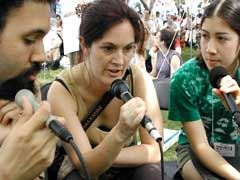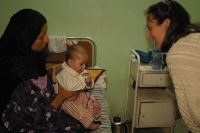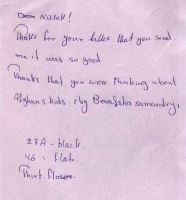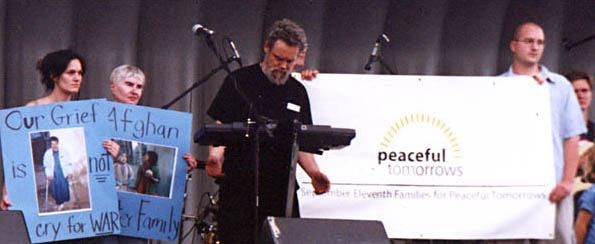 |
| Eva Rupp, who lost her stepsister on September 11th speaking to WBAI, a New York City radio station. |
Peaceful Tomorrows was formed out a group of people who had lost loved ones in the World Trade Center attacks on September 11, 2001. They were united in their grief and shock, and more importantly, they were united in their belief that going to war with Afghanistan would not be a constructive way to deal with the tragedy.
This year, some of the group's members took a ride on the "Peace Boat," a mobile educational program promoting peace and human rights issues. The boat had traveled from Japan to New York City. It carried several survivors of the atomic bombs that the U.S. dropped on Hiroshima and Nagasaki in 1945.
This summer, the group's members also collaborated on and published a book. September 11th Families for Peaceful Tomorrows: Turning our Grief into Action for Peace tells about the group's history and about the necessity for peace activism today more than ever.
 |
| Peaceful Tomorrows Iraq Delegation January 2003. Photo by Linda Panetta |
Almost immediately, this group began taking huge steps: both in broadcasting their message, and also in engaging in peaceful communication between the United States and the Afgahnis. Their intention was to show the people of Afghanistan that the belligerent actions of the United States could not be taken with the full support of the people, nor could war be waged on behalf of the American people, since so many Americans did not want to start a war on the impoverished and beleaguered nation.
 |
| A note from an Afghani child. |
Barry Amundson, whose brother was killed at the Pentagon, explains why he and so many others prefer a peaceful reaction to a violent one:
While grieving for my brother, my family discussed how we certainly wanted justice brought to those who had been done this. It made us very sad and confused that there were going to be innocent civilians killed as a result of my brother's death. If there was going to be a military retaliation, then that would mean that other families would be devastated just as ours had been.
One of Peaceful Tomorrows' first actions was a trip to Afghanistan in January 2002 to meet the families of the towns where the U.S. was bombing. They discovered a world so different from ours, yet populated by people with fears and hopes so similar to ours. The four Peaceful Tomorrows representatives brought donations, cards and letters from children in the US, expressing a message of friendship to the children of Afghanistan. A classroom of older students (15-20 year old young women) at the Alfatha school for girls in Kabul wrote back to their new pen pals.
 |
| At the April 10, 2003 march on Washington D.C. Derrill Bodley sings as Eva Rupp and Rita Lasar hold signs reading "our grief is not a cry for war" with photos of families affected by the US bombing in Afghanistan. |
When they returned in February, "September 11 Families for Peaceful Tomorrows," as they now declared themselves, wrote a letter to George Bush. The letter asked him to seek a peaceful solution to the situation in Afghanistan. "A Valentine to George Bush" explained the position of these united families, describe their findings and requested a meeting with the president. Nine months later, they went to the White House for Thanksgiving. They weren't sitting at a table with the Executive himself, though; they were standing outside in the cold, holding signs and demanding peace.
Peaceful Tomorrows' Ryan Amundson, who lost his brother Craig at the Pentagon, said, "This Thanksgiving, I am grateful for the compassion shown to my family, both from friends as well as strangers, following the death of my brother. I feel the best way to show my gratitude is to extend this compassion to victims' families in Afghanistan who have also suffered as a result of the September 11 terrorist attacks."
The group also took the opportunity to take a stand against waging an undeclared war in Iraq.
 |
| The April 10, 2003 march on Washington D.C. drew thousands of people in support of peaceful solutions to world problems. |
Page created on 8/29/2003 1:44:56 PM
Last edited 8/29/2003 1:44:56 PM

 |
| Peaceful Tomorrows members stand in solidarity against a possible war on Iraq at the Feb. 15th Rally in New York City. The sign quotes Martin Luther King Jr., who said: "wars are poor chisels for carving out peaceful tomorrows." |